Canine parasites come in a lot of different shapes and sizes, none of them pretty, and they’re most definitely ALL unwanted visitors!
In This Article You Will Read About
Some parasites are external and live on the outside of a dog’s body, others take up residence deep inside (internal parasites)…..
…. but regardless of where they live (or whether or not you can actually see them) they can make your dog miserable and sick, plus they cause a lot of damage if left untreated.
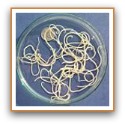 Roundworms
Roundworms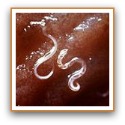 Hookworms
Hookworms Heartworms
Heartworms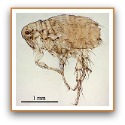 Fleas
Fleas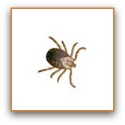 Tick (before biting your dog)
Tick (before biting your dog)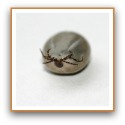 Tick afterwards (full of blood)
Tick afterwards (full of blood)
Types of Parasites In Dogs
Worms are one of the most common types of parasites in dogs, and in fact almost all puppies are born with roundworms which have been passed on to them from their mommas.
Visit my Canine Worms page to learn all about worms, and how to protect your Rottie.
Roundworms and tapeworms (transmitted by fleas), hookworms, and whipworms migrate to your dog’s digestive tract and live out their lifecycle in the intestines.
They multiply in numbers very rapidly and because these canine parasites feed off your dog’s blood.
If you don’t recognize and treat the problem they cause varying degrees of weakness and nutrient deficiency, which can get worse rapidly.
A puppy (or even an older dog) with an untreated worm problem may well die as a result of the infestation so although worms dog worms are very common, they’re not something to be taken lightly!
Heartworms in dogs are even more serious as these nasty canine parasites travel to your pet’s heart rather than his intestines. When they multiply and grow in that vital organ they cause destruction and havoc.
Making sure that your dog doesn’t become infected with heartworms (they’re transmitted by mosquitoes) is vital because this is a very dangerous condition, difficult to treat and often fatal.
Prevention and a regular schedule of deworming is key to keeping your dog worm-free.
If this is your first puppy, or he’s very young, I recommend getting him dewormed regularly by your veterinarian at the same time as you get his puppy vaccinations taken care of.
I don’t recommend using the majority of over-the-counter dog deworming products available because they’re not very effective and can have nasty side effects.
But if you’re experienced with dog care and you know a simple dewormer is needed, you can deworm your pup yourself. There’s a safe, effective, FDA-Approved broad spectrum de-wormer you may want to consider called Panacur C – Canine Dewormer.
It’s probably one of the most popular products used by dog owners for treating the common canine parasites called intestinal dog worms.
When it comes to heartworm, a monthly dose of heartworm preventative such as Heartgard (can be purchased with a prescription from your veterinarian) is essential year round.
A generic alternative (with the same active ingredients as Heartgard) available without a prescription is Iverhart Plus. This works in exactly the same way as Heartgard and will do the same job, it’s also a little cheaper.
As an added bonus, these products also protects against the canine parasites roundworms and hookworms.
Your dog can contract hookworms from the soil, from eating an animal (roadkill, vermin) who has a hookworm infestation, or from licking an infected dog, eating contaminated feces and more.
This can be very serious, especially in young puppies, and a hookworm infestation can cause severe anemia.
To find out more about all about the different types of dog worms and learn how to protect your Rottweiler puppy or dog, visit my Canine Worms page now.
Fleas & Ticks
A couple of the most well-known external canine parasites are fleas and ticks.
No matter how careful you are, most dogs will pick up one or two of these critters from time to time and this isn’t a huge problem.. however if they take up residence and start to multiply then there’s going to be trouble!
Fleas not only make a dog itchy and uncomfortable, but they’re a common trigger for dog skin conditions due to the fact that many dogs are sensitive, or allergic, to flea saliva.
Rottweilers as a breed tend to have more than their fair share of allergy problems, so keeping these canine parasites off your pet is a high priority.
In addition to causing skin related misery, fleas on dogs can transmit tapeworms and ticks can be carriers for all sorts of nasty diseases including Lyme Disease, Rocky Mountain Spotted Fever, Babesia and more.
The best way to prevent your Rottie from becoming a ‘squat’ for fleas and ticks is to treat him regularly with an effective flea and tick preventative.
There are several well-known brands on the market, but my favorite (and by far the most successful this year) is K9 Advantix II.
This isn’t just effective against fleas and ticks, but also repels and kills mosquitoes, biting flies and chewing lice. Living in the country I can personally attest to the necessity of using a product like this on your dog/s on a monthly basis!
In some parts of the US (and worldwide) you may only need to use a flea/tick preventative during the warmer months, in others it should be a year-round habit.
Dog Mites
Dog Mites are tiny (and I mean tiny – you won’t see them with the naked eye!) canine parasites that generally come in two different species… ear mites and skin mites.
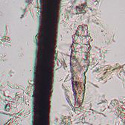 Demodex Mite (c. Wikipedia JoelMills)
Demodex Mite (c. Wikipedia JoelMills)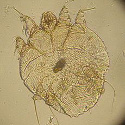 Sarcoptes Mite (c de.Wikipedia Kalumet)
Sarcoptes Mite (c de.Wikipedia Kalumet)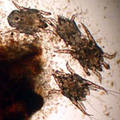 Canine Ear Mites
Canine Ear MitesDog Mites are tiny (and I mean tiny – you won’t see them with the naked eye!) canine parasites that generally come in two different species… ear mites and skin mites.
They pierce your dog’s skin and burrow underneath, causing severe irritation and itching plus a multitude of other symptoms.
The symptoms of an ear mite problem usually include intense scratching at the ears, repeated head-shaking, and you’ll usually notice red inflamed/scabby ears on the outside and dark brown, crumbly or ‘dirty’ ears on the inside.
If you suspect your Rottie has ear mites, take him to your veterinarian for an exam that way you can be sure you’re treating the right problem.
Your vet may prescribe medication to help clear up the problem, or you can use a product like Eradimite Ear Mite Treatment or Mita-Clear which both contain a combination of the parasticides Pyrethrin and Piperonyl Butoxide.
Other canine parasites such as the tiny skin mites – the eight-legged demodex mites and the sarcoptic mites – play havoc with the skin on your dogs body.
Their burrowing behavior again often causes intense itching and discomfort, accompanied by patchy hair loss and a rash. This is generally known as a condition called Mange.
Although Rottweilers aren’t one of the breeds inherently susceptible to Mange in dogs, it can show up in any dog of any breed. It often erupts when a puppy or dog’s immune system is under strain… such as during illness, major life-changes, vaccination and so on.
You will need your veterinarian to take a small skin-scraping from your dog (don’t worry, it’s not painful) and examine it under a microscope in order to make a diagnosis of Mange.
If the sample is positive for mites, then there are several effective treatment options including special dips, lotions and shampoos.
Sometimes other medications may be prescribed too, depending on the severity of the problem.
If you have questions about canine parasites of any kind, or other niggling worries, you can get peace of mind for a lot less than the cost of a vet visit by asking an online veterinarian.
The box to the right will let you do just that!
Related Pages:

